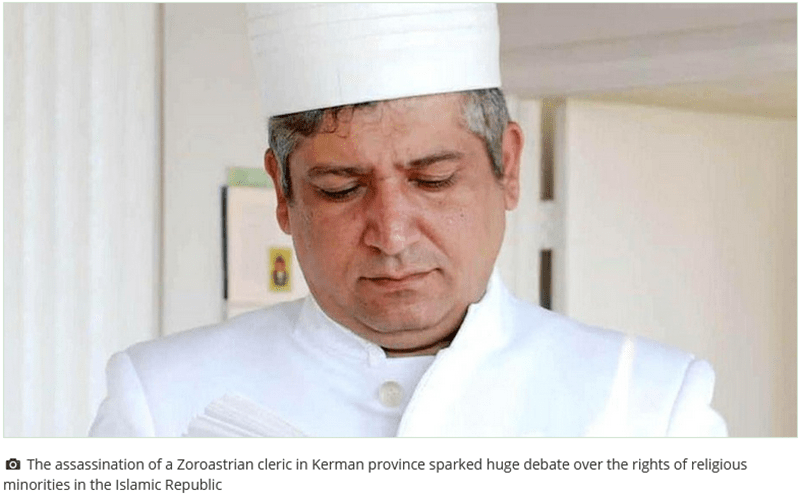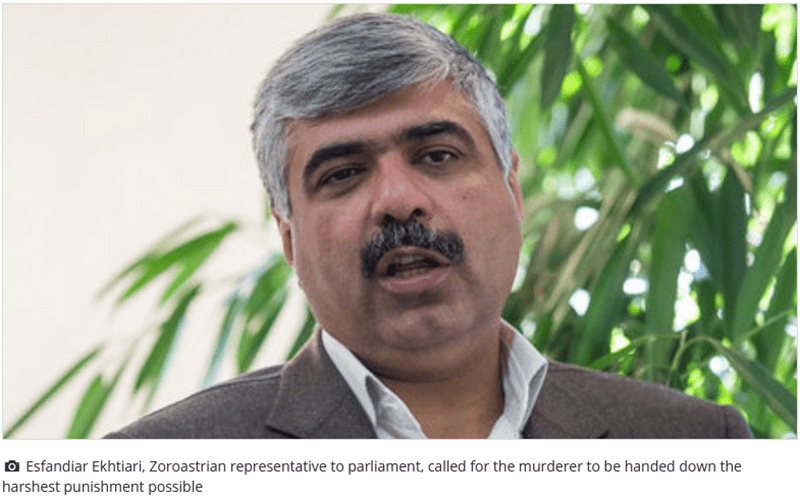The murder of a Zoroastrian cleric in Kerman province in late July has sparked fresh debate over the rights of religious minorities in the Islamic Republic.
In Iran, non-Muslims are not entitled to the same legal rights as Shia Muslims, and this has a huge impact on the way murder is dealt with in the country. If a non-Muslim is killed by a Muslim, intentionally or otherwise, the victim and his or her family is not entitled to qisas, or retribution in kind. This is one of the most discriminatory laws used against non-Muslims in the Islamic Republic.
Some minority religions are recognized in Iran’s constitution, and Zoroastrianism is one of them, in theory affording them greater rights than unrecognized religions such as the Baha’i faith. But even so, people practicing these “official” religions still face harsh discrimination.
Article published on Iran Wire
***
Responding to the murder of Arash Kasravi and two other people in late July, Esfandiar Ekhtiari, the Zoroastrian representative in Iran’s parliament — also known as the Islamic Consultative Assembly — called on the Kerman police chief to ensure the killer or killers face severe punishment for the crime. The bodies of Kasravi and his companions were identified by the Tehran Criminal Police on Friday, July 24. The exact time of the murder and the identity of the killer have not yet been determined.
Zoroastrian Kourosh Niknam, a former member of parliament, explained further: “In legal terms, ‘severe punishment’ means the maximum penalty that can be applied.” But according to Niknam, the term as it appears in Iran’s Islamic Penal Code applies to Muslims only and not to non-Muslims.
“The terms qisas and blood money in Islamic law relate to the value of the human body,” he told IranWire when asked about the different experiences of religious minorities and Muslims according to Iranian law. “Accordingly, because of the difference between the value of a woman’s body and a man’s in Islam, the value of blood money for the two is different.” In the same way, he said, traditionally, “the value of a non-Muslim body is less than that of a Muslim.”
However, legal professionals and Zoroastrian politicians, including Khosrow Dabestani, campaigned for reform regarding blood money and qisas. “In the sixth term of parliament [2000-2004], when Khosrow Dabestani was a parliamentarian, blood money for official minorities recognized in the constitution became equal to that of Muslims,” Kourosh Niknam said.
“In the sixth term of the parliament, when Khosrow Dabestani was a parliamentarian, blood money for official minorities as recognized in the constitution became equal to that of Muslims,” Kourosh Niknam said.
Move for Change
“At that time, the blood money of non-Muslims was 290,000 tomans and the blood money of Muslims was 6 million tomans,” said Yonathan Betkolia, secretary general of the Assyrian Union and former representative for Assyrians in the sixth parliament. He described efforts to overhaul what he described as a “fundamental problem” and the challenges they faced as lawmakers. “We submitted a bill to parliament that was approved, but the Guardian Council rejected it. Finally, it was sent to the Expediency Council, which, with the approval of the Leader and the ruling government, equated the blood money of non-Muslims with Muslims.”
Kourosh Niknam says current implementation of the reform depends heavily on the judge overseeing the case, and in Iran, judges are all Muslim.
“A Muslim judge can comment on this issue, citing the possibility that the payment of equal blood money to a non-Muslim in a certain city or in certain circumstances could cause chaos,” he said. “Of course, at the moment, because the insurance company mainly pays blood money, this issue is not often addressed.”
Legal experts, however, confirm that civil society activists are limited in what they can achieve.”Qisas is part of Islamic jurisprudence,” Niknam acknowledges. “Accordingly, it cannot be requested for a non-Muslim.”
Lawyer Nemat Ahmadi confirmed this. ”Qisas is a jurisprudential and religious issue, and change has to be enacted through those same channels,” he told IranWire. “That is, the [Islamic theological authorities] mujtahids and the ulema must reach a clear conclusion and opinion about it.”
An activist in Iran with good knowledge of the principles of jurisprudence confirmed to IranWire that changing the way qisas was applied would be extremely difficult because it is based on the Koran. “The great Islamic [Sunni] schools of Hanbali, Shafei, Hanafi, Maliki, and the Twelve-Imam Shias have a fixed ruling on qisas, which differ little in details,” he said.
One religious scholar told IranWire that, in recent years, scholars have made various attempts to change the rules, and to add various clauses to them: “Scholars such as Allameh Seyed Javad Alavi Boroujerdi and Allameh Seyed Hassan Heidari have tried to update these laws by offering new interpretations. They say some Islamic laws belong to the beginning of Islam and that modern circumstances dictate these situations must be dealt with in a different way.”
Under the laws of jurisprudence, if a Muslim kills a non-Muslim, even intentionally, he will not be executed, and this stands whether it is from a Sunni or Shia perspective. Punishment includes five to seven years of imprisonment, exile, tazir [punishment decided by the judge] and flogging. A victim’s family can impose the hadd (whip) themselves. In this case, the payment of blood money to the victim’s family is mandatory. If for any reason the killer is unable to pay the blood money, from the jurisprudential point of view, the Muslim judge has a duty to carry out a suitable punishment.
No Equality
But Fred Petrosian, a journalist and minority rights researcher, points out the negative aspects of interpretation, some of them very obvious: “Because of the structure of the Islamic Republic, which sees itself as a divine instrument for enforcing Islamic law, Iranian citizens are not equal in reality … In recent decades, the Iranian government has inadvertently given a superior status to the Shias. This religious discrimination and the division of citizens into [first- and] second-class groups have meant the lives of many people in Iran face serious challenges.”
There are various accounts of how these discriminations have been carried out. “In the winter of 1998, 13 Jews from Shiraz were arrested on false charges of espionage or similar cases,” Pouya Dianim, head of the American Jewish Association’s public relations committee, told IranWire. “Many were arrested, imprisoned or executed in previous years. These clashes have caused the Jewish community in Iran to be more cautious about political issues than ever before. In the current situation, except for the Jewish representative in parliament — which is more of a propaganda tool for the government — no other political voice is heard from our community.”
Dianim says the regime’s formal and informal treatment of Jews has made many inside the country more cautious, and that this has had an impact on the pursuit of their rights. He added that some Jewish groups believe in silent diplomacy, while others say the voice of the community should be heard through the media, the internet, and so on. The impact of the hashtag “Do_not_execute,” in which hundreds of thousands of people around the world and in Iran called for the lives of three Iranian men to be saved, showed that talking about problems can be fruitful.
Petrosian likens what is happening in the current situation in Iran to religious apartheid: “In the current situation, a part of Iranian society that is not recognized in the constitution is practically ignored, has no rights, and is viewed as ‘groups of ghosts’ by the government and not seen at all.”
He says Baha’is and Yarsans [Ahle Haqq] are among the groups whose existence and rights are practically ignored due to the religious nature of the government. These people do not have the right to discuss qisas, or any other right.
Discrimination Against Baha’is
“In all the years that have passed, Baha’i rights have been violated in various ways,” Vahid Vahdat-Haq, a researcher on religious law and a member of the Baha’i community, told IranWire. “Unauthorized entry into homes, searches and seizures of household items, deprivation of the right to education, expulsion from school, and social or political activities are among the serious discriminations and restrictions that exist for the Baha’i community in Iran.”
“Over the years, in some cases, people have been abducted and disappeared,” he said. “No trace of them was ever found, and the government shied away from its responsibilities. It appears that Baha’i blood is considered halal in the Islamic Republic; this means that killing Baha’is, even in the case of premeditated murder, is okay, there is no need to pay blood money, and the killer will be practically exempt from prosecution.
“In some cases where a trial was held, the killers insisted they had heard that Baha’is were Muslims who had converted to the Baha’i faith and therefore are apostates. For this reason, shedding their blood is rewarded.”
The murder of Farhang Amiri, a Baha’i living in Yazd who was killed three years ago by two Muslim brothers, is one example of this severe discrimination. The killers had told the court, “He was a Baha’i, we killed him to buy the paradise for seven generations.” They were released on bail a few months later.
“Since the emergence of this religion, there have been many clashes, but after the formation of the Islamic Republic, the clashes continued systematically,” says Vahdat-Haq. “In the current situation, the basic citizenship rights of Iranian Baha’is have been taken away. Simple salaries and loans, check-cashing, buying property, and so on are just some of the many areas in which Baha’is in Iran have no right.” Vahdat-Haq also cites authorities’ refusal to issue national ID cards for Baha’is as another discriminatory practice.
The Bahai’s are not recognized in Iran, and they are denied a range of rights. However, even among the recognized minority religions of Iran such as Zoroastrianism, these rights are often far out of reach.


